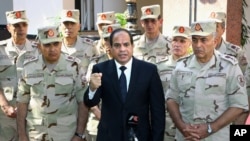Egyptian President Abdel Fattah el-Sissi said militant attacks on army checkpoints in the Sinai Peninsula that killed 30 troops Friday were a "foreign-funded operation" and those who commit such attacks "must be hanged."
The president vowed Saturday to take drastic measures against the militants, saying there are foreign powers that want to "break the back of Egypt."
Egypt declared a three-month state of emergency in the northern and central Sinai Peninsula and closed the Rafah border crossing to Gaza after the pair of attacks Friday, both against security checkpoints. A nightlong curfew — from 5 p.m. to 7 a.m. — also was imposed in towns and villages across the Sinai.
The troops' deaths struck a nerve among many Egyptians, who want an end to the terrorism that has plagued parts of the country for months. A group of Egyptians in Cairo on Saturday carried placards and chanted against the violence.
A mother of one of the soldiers who died Friday shook her hands in despair and demanded retribution. An older man lamented that the victims were innocent and did not deserve to die. Another man said, “Egyptians are tired of violence, and it's time to put a stop to it.”
A presidential decree affirmed that “the army and police will take all necessary measures to tackle the dangers of terrorism and its financing, to preserve the security of the region ... and to protect the lives of Egyptians.”
In an emotional address Saturday, Sissi, flanked by top army officers, said Egypt is facing an “external enemy” trying to wreak havoc. "Beware," the president insisted, "of what they are trying to do to us."
Sissi said Egypt is waging an “existential battle” against terrorism, one that will last a long time. But he predicted the country would “persevere and triumph in the end.”
Accounts of Friday's most damaging attack said a suicide bomber rammed his vehicle into an army checkpoint north of the Sinai town of el Arish, killing dozens of soldiers. A separate gun attack at another checkpoint south of el Arish killed one officer and wounded two other troops.
Veteran Egyptian editor and publisher Hisham Kassem told VOA that many analysts believe terrorists in the Sinai are linked to other terrorist groups across the region.
"It's a network — a group of terrorist entities — spread geographically much further than anyone realizes," he said. "The focus right now is on the Islamic State, but it extends much further than that: across sub-Saharan Africa" from Al-Shabab in Somalia and Boko Haram in Nigeria to terror groups in Mali.
Kassem noted that Sissi alluded in his speech to “setting up a buffer zone” south of the Rafah border crossing with Gaza. However, he said the lack of support from local residents made him skeptical that such a plan could succeed.
No one has claimed responsibility for Friday's violence. But Egypt's most active Islamic militant group, Soldiers of Egypt, has claimed previous attacks. Those include one in Cairo earlier this month that wounded 12 people.
A terrorist group that calls itself Ansar Bait al-Maqdis frequently takes responsibility for terrorist operations in the Sinai. Some Egyptian analysts have tied the group to Hamas, the group that controls Gaza and is listed as a terrorist organization by the United States and others. Hamas militants deny those charges.




